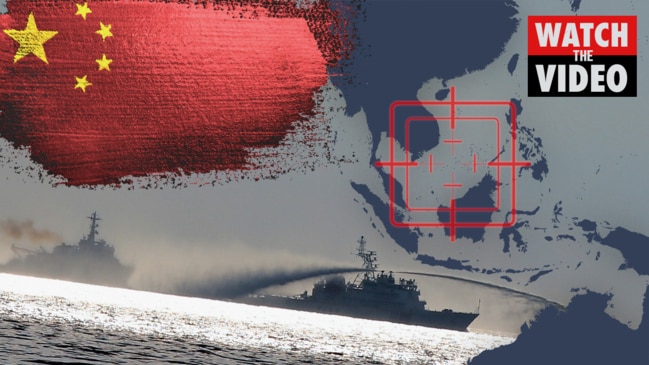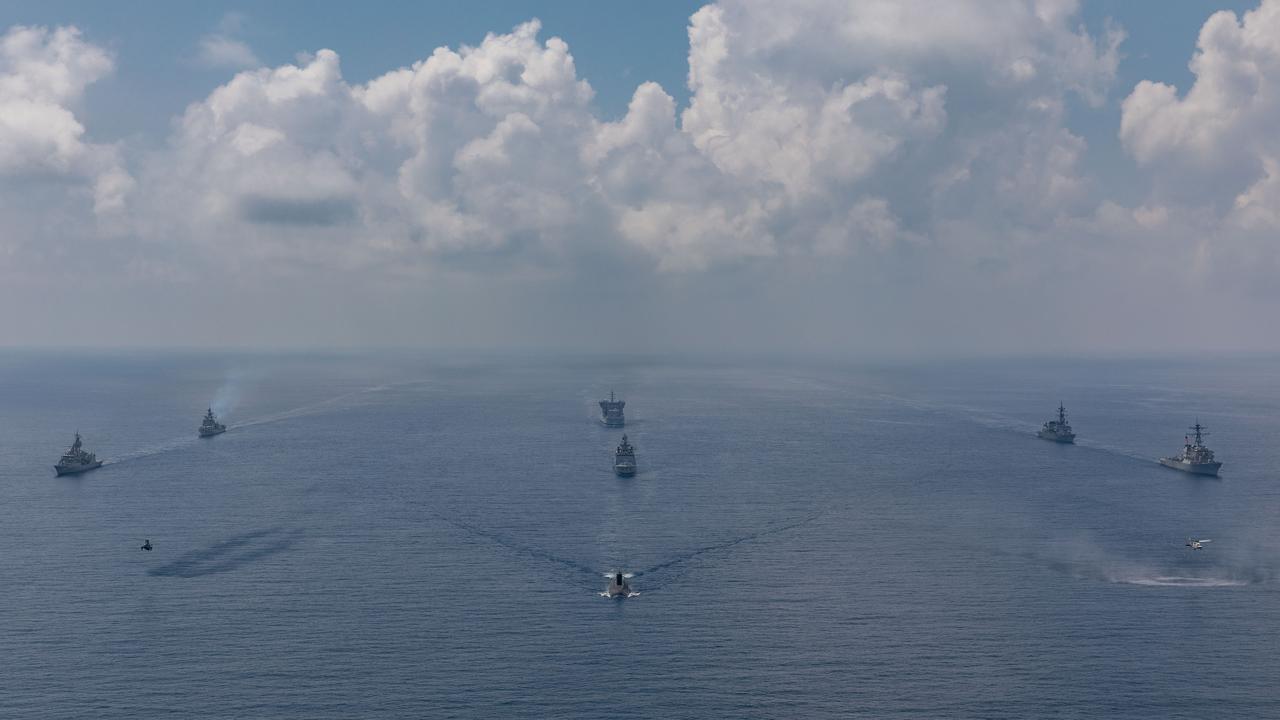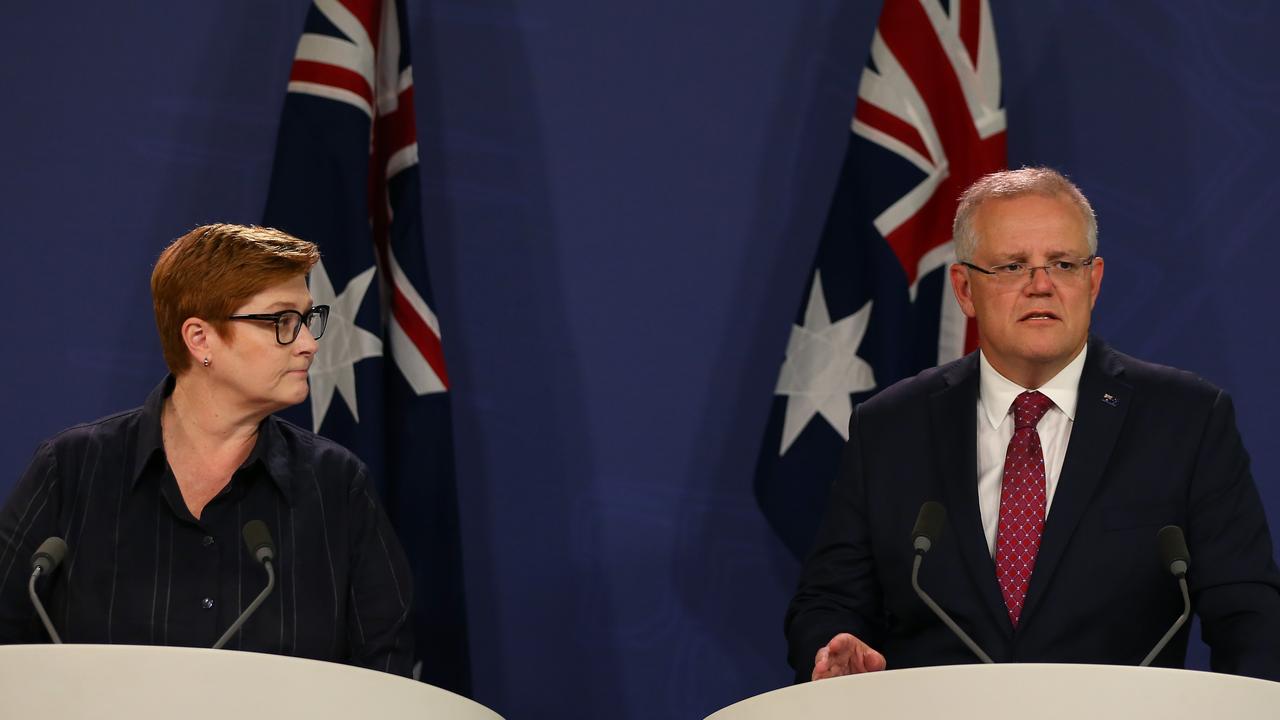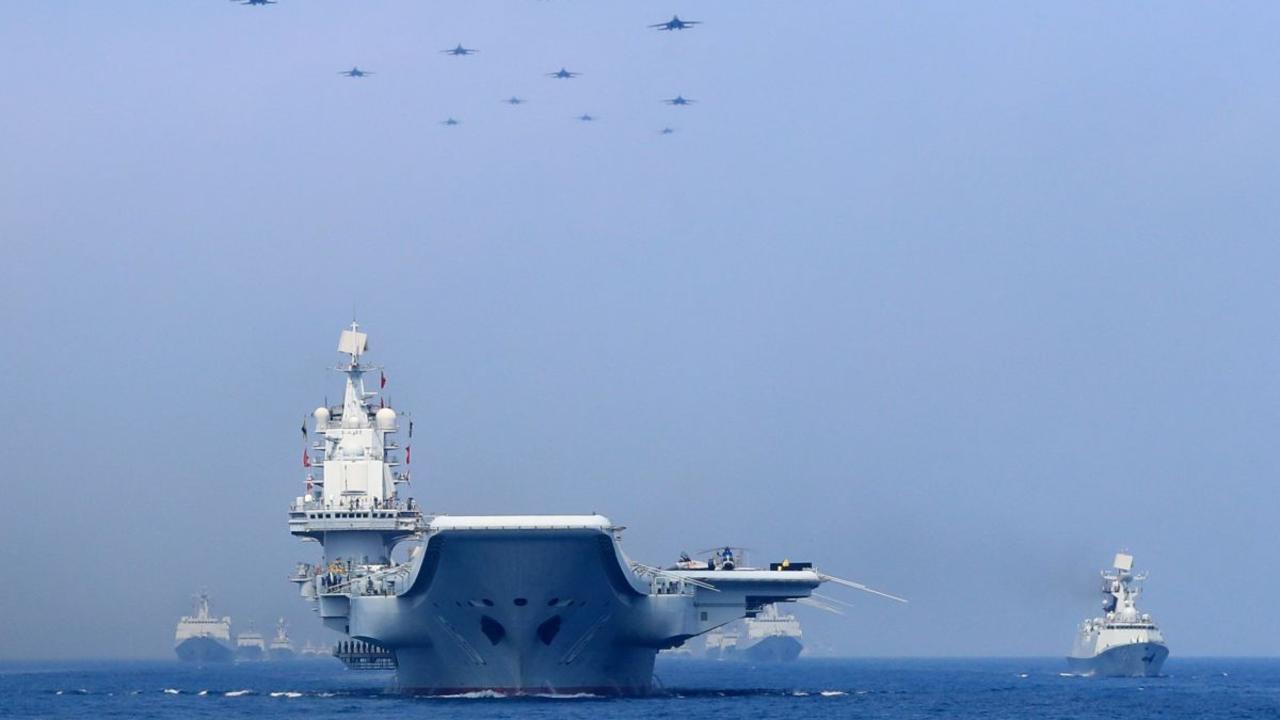China’s swipe at Australia over joining Malabar war games
Australia has buddied up with Japan, India and the US for this year’s Malabar war games and China’s taken aim at our new alliance.

It’s a “hollow bluff”. It’s “irrational”. It’s “interference”. Beijing is upset India has invited Australia to join it, Japan and the United States to play war games in its own backyard. But China only has itself to blame.
For the first time in more than a decade, the warships of all four major Indo-Pacific democracies are manoeuvring together in the Malabar naval exercises. It marks an evolution of an informal ‘Quad’ partnership into a potential strategic alliance.
It also represents a seismic shift in the regional power balance.
“In essence, Xi Jinping’s horrific foreign policy pissed off the Aussies (one of China’s major trade partners who refused to be bullied) to the point where they eagerly joined in on the fun,” writes Asia Times commentator Dave Makichuk.
RELATED: China’s aggression backfires

RELATED: ‘Prepare for war’: China hits back
Canberra’s path to joining such high-level war-games with its powerful Indian Ocean neighbour has been long and stormy. New Delhi has in the past been reticent to upset Beijing by strengthening regional ties. But the power balance has shifted against it anyway.
Thousands of troops are facing off over the high Himalayan border between India and China. Canberra, meanwhile, is enduring severe economic coercion after openly defying Beijing’s demands.
The authoritarian state appears surprised this is driving the democracies closer together. Chinese Communist Party (CCP) controlled media outlet Global Times labelled the joint exercise a “hollow bluff”.
“Despite the drill jointly participated by India, the US, Australia and Japan, experts noted that such an ill-intentioned attempt to corner China is a hollow bluff, and China will not be disrupted by India’s irrationality or US interference,” the article asserts.
OUTCAST AUSTRALIA
Beijing’s wolf-warrior diplomats have so far been unusually restrained over the four-nation co-operation exercise.
On Tuesday, Chinese Foreign Ministry spokesman Wang Wenbin said Beijing hopes the military drills will be “conducive to regional peace and stability, rather than the opposite”.
CCP-controlled media has been less diplomatic. But it has been revealing.
It is emphasising just how on-the-nose Canberra is with Beijing.
“The fact that India invited Australia means India chose to fall out with China,” Communist Party international affairs researcher Hu Zhiyong told the Global Times. “Australia has a bad record in co-operating with the US to smear and attack China repeatedly on issues such as Huawei, Hong Kong and the COVID-19 epidemic.”
Canberra also opposes Beijing over its ‘social engineering’ efforts among the ethnic peoples of Xinjiang and Tibet, as well as its arbitrary claim to ownership of the South and East China Seas.
“Australia’s participation makes this year’s Malabar exercises bigger than last year’s, but China will not be intimidated by an ordinary annual military exercise,” Dr Hu declares.
Australia’s Defence Minister Linda Reynolds said the naval manoeuvres demonstrated the “strategic trust” the four democracies held in each other, “but also strengthens our collective ability to contribute to regional security”.
Beijing has this week imposed a new round of trade restrictions against Australian produce, ranging from wine through to lobsters.
But it also singled out India and Japan for some harsh words.
“It is very unwise and irrational for the Modi government to hold the naval drill that includes all Quad countries,” Dr Hu says, adding that any opposition to Beijing’s ambitions would be short-lived. “The military capacity gap between China and India is huge, and it’s not difficult for a Japanese leader to tell China is a better trade partner and a bigger market.”
RELATED: Tiny island China desperately wants

GAME OF THRONES
Communist Party commentators are accusing the four nations of hoping to establish an “Asian version of NATO”, turning the Indo-Pacific region into a “geopolitical hot spot”.
“The Malabar exercises claim to counter China’s influence, but China will not slow its development because of external turbulence. China’s influence is determined by its own development,” commentator Zhang Yi writes for the Global Times.
That development includes the extensive infrastructure investments along the Indian Ocean “belt” linking the Middle Eastern oilfields to the South China Sea. Beijing’s navy has dramatically increased operations along that route in recent years.
Which is why the CCP sees the strengthening Quad relationship as a significant roadblock to its ambitions.

“In the foreseeable future, the US is likely to draw other regional countries into its military orbit,” Zhang writes “Even Germany wants to get involved in the Indo-Pacific region. Germany is anticipated to join the Australian navy and patrol the Indian Ocean.”
India, however, has a different perspective.
Its navy said in a press release that the Malabar exercise “is based on their (the Quad’s’) shared values and commitment to an open, inclusive Indo-Pacific and a rules-based international order”.
Beijing, however, complains the Indian Ocean is getting crowded.
Increased “external power” activity there can only increase tensions, Zhang says. “When a region has gotten too many external powers involved, the region is bound to face geopolitical rivalry and see more uncertainties.”
He failed to note that the closest Chinese territory is also thousands of kilometres away.
“The geopolitical games by the four players of the Malabar exercises cannot hinder China’s own development,” he added.
SHOW OF STRENGTH
The Quad warships, warplanes and military personnel are engaging in a two-phased training exercise through November.
Phase 1 finished on Friday in the Bay of Bengal after a week-long regime of refuelling, anti-air and anti-submarine operations.
Phase 2 kicks off on November 17. More warships and aircraft will join the fleet in the Arabian Sea.
Taking part are the modern Arleigh Burke-class guided-missile destroyer USS John S McCain, the Australian frigate HMAS Ballarat, the Japanese destroyer JS Onami, the Indian warships Shakti Ranvijay and Shivalik, and the submarine Sindhuraj.
“It is fitting to see our navies operate in a high-end, tactically relevant exercise like Malabar,” USN Captain Steven DeMoss said in a statement. “It is another opportunity to further strengthen our combined capabilities and enhance our partnerships.”
HMAS Ballarat’s commanding officer Commander Anthony Pisani added: “We are looking forward to the opportunity to exercise with our partners and contribute to the security, stability and prosperity of the region.”
India and the US initiated the Malabar exercise in 1992. Australia last participated in 2007.
China has itself been engaged in an almost continuous series of naval war-games in the South and East China Seas. Ships and aircraft have been probing its boundaries with Taiwan, while amphibious forces have been practising beach assaults.
These have all been a “necessary” show of strength to enforce China’s “sovereignty”, Beijing asserts.
Jamie Seidel is a freelance writer | @JamieSeidel




